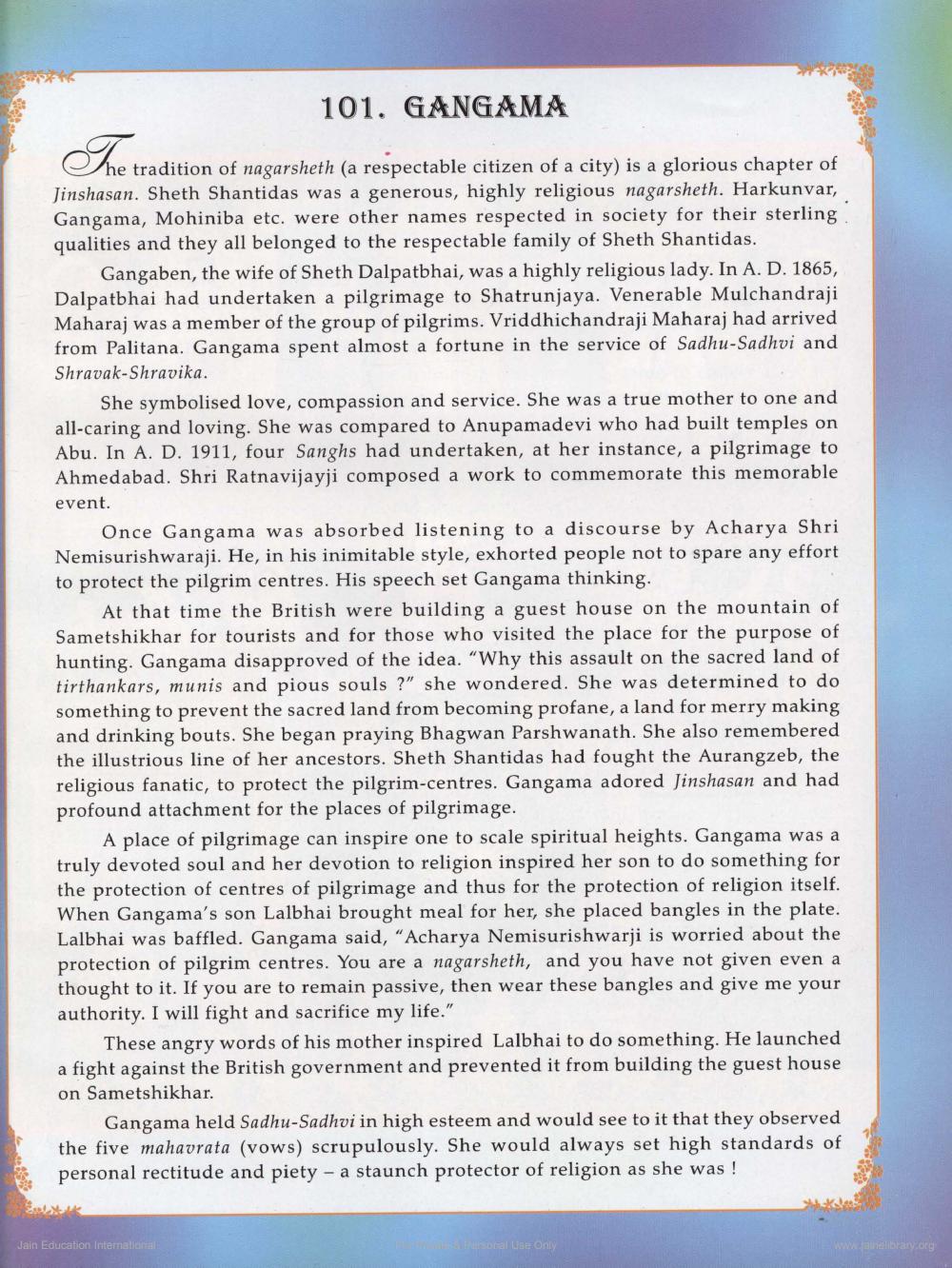________________
101. GANGAMA
he tradition of nagarsheth (a respectable citizen of a city) is a glorious chapter of Jinshasan. Sheth Shantidas was a generous, highly religious nagarsheth. Harkunvar, Gangama, Mohiniba etc. were other names respected in society for their sterling qualities and they all belonged to the respectable family of Sheth Shantidas.
Gangaben, the wife of Sheth Dalpatbhai, was a highly religious lady. In A. D. 1865, Dalpatbhai had undertaken a pilgrimage to Shatrunjaya. Venerable Mulchandraji Maharaj was a member of the group of pilgrims. Vriddhichandraji Maharaj had arrived from Palitana. Gangama spent almost a fortune in the service of Sadhu-Sadhvi and Shravak-Shravika.
She symbolised love, compassion and service. She was a true mother to one and all-caring and loving. She was compared to Anupamadevi who had built temples on Abu. In A. D. 1911, four Sanghs had undertaken, at her instance, a pilgrimage to Ahmedabad. Shri Ratnavijayji composed a work to commemorate this memorable event.
Once Gangama was absorbed listening to a discourse by Acharya Shri Nemisurishwaraji. He, in his inimitable style, exhorted people not to spare any effort to protect the pilgrim centres. His speech set Gangama thinking.
At that time the British were building a guest house on the mountain of Sametshikhar for tourists and for those who visited the place for the purpose of hunting. Gangama disapproved of the idea. "Why this assault on the sacred land of tirthankars, munis and pious souls ?" she wondered. She was determined to do something to prevent the sacred land from becoming profane, a land for merry making and drinking bouts. She began praying Bhagwan Parshwanath. She also remembered the illustrious line of her ancestors. Sheth Shantidas had fought the Aurangzeb, the religious fanatic, to protect the pilgrim-centres, Gangama adored Jinshasan and had profound attachment for the places of pilgrimage.
A place of pilgrimage can inspire one to scale spiritual heights. Gangama was a truly devoted soul and her devotion to religion inspired her son to do something for the protection of centres of pilgrimage and thus for the protection of religion itself. When Gangama's son Lalbhai brought meal for her, she placed bangles in the plate. Lalbhai was baffled. Gangama said, “Acharya Nemisurishwarji is worried about the protection of pilgrim centres. You are a nagarsheth, and you have not given even a thought to it. If you are to remain passive, then wear these bangles and give me your authority. I will fight and sacrifice my life."
These angry words of his mother inspired Lalbhai to do something. He launched a fight against the British government and prevented it from building the guest house on Sametshikhar.
Gangama held Sadhu-Sadhvi in high esteem and would see to it that they observed the five mahavrata (vows) scrupulously. She would always set high standards of personal rectitude and piety - a staunch protector of religion as she was !
Jain Education International
total Use Only
www.
library.org




